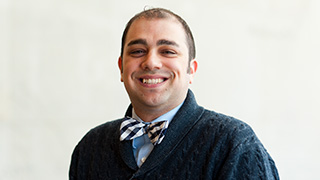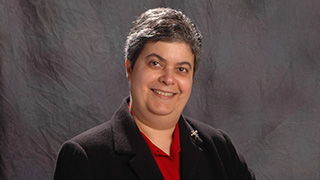Seton Hall’s Segal and LaFountaine Granted New Funding
Wednesday, February 21, 2024

Professor Michael LaFountaine
Last fall on the Seton Hall campus, research professors maintained their commitment to securing important funding, resulting in significant grants supporting rehabilitation and sports science, occupational therapy, and speech language pathology.
One standout is a 3-year, $556,000 grant, awarded to Professor Michael LaFountaine, associate dean for academic affairs and research and professor in the Department of Physical Therapy in the School of Health and Medical Sciences by the New Jersey Commission on Spinal Cord Research. His project, entitled, "Exploring the Impact of Calcitonin Gene-Related Peptide on the Pain Experience of Persons with Chronic Spinal Cord Injury (SCI)," will investigate whether specific combined genes create greater pain in individuals living with SCI than others with a different genetic makeup.
"A SCI occurs when the spinal cord is damaged after a traumatic event," explains LaFountaine, "and can cause paralysis and disruptions to numerous body functions in areas below the level of injury." Many people who live with the aftermath of an SCI report experiencing prolonged pain due to nerve damage, so Lafountaine and colleagues at Spinal Cord Injury Research Center at the James J. Peters VA Medical Center (Bronx, NY) and the Icahn School of Medicine at Mt. Sinai (New York City), will be researching the calcitonin gene-related peptide (CGRP) which is often released in response to an injury to a nerve.
LaFountaine reports that the idea for the newly funded study originated from another study focused on autonomic nervous system dysfunction after sports concussion injuries. He and his team, he says, found that "the posttraumatic headache burden after concussion appeared to be related to a combination of CGRP genes. While I was learning more about CGRP during the preparation of the manuscript and presenting the findings at conferences, I kept thinking about how CGRP could be important in helping to understand chronic pain in SCI and lead to potential treatments."
He notes that there are several Food and Drug Administration approved medications available for the treatment of migraine headaches that interfere with CGRP activity, so the possibility of applying these medicines in cases of SCI, is exciting. "If our new project demonstrates a positive relationship between CGRP and pain, the opportunity to develop clinical trials with an off-label use of these medications could provide a non-opioid alternative to managing chronic pain and achieving sustainable pain relief in persons living with chronic SCI," LaFountaine said.
LaFountaine has conducted SCI research for more than 20 years; he began as a research assistant at the Kessler Medical Rehabilitation Research and Education Corporation (now known as the Kessler Foundation). His recent work with the Calcitonin gene-related peptide, he said, reminded him anew of his love of research. "This experience has been a reinvigorating moment for me as a scientist, especially since most of my attention has shifted to administration over the last 5 years," said LaFountaine. "I really look forward to seeing where this goes and the unknown opportunities that it creates in the coming years."

Professor Ruth Segal
September 2023 was also a prolific month for another research faculty member, Professor Ruth Segal. Segal is the department chair and professor within the Department of Occupational Therapy, and will co-direct a new five-year training grant of over $1.18 million through the departments of Occupational Therapy (OT) and Speech-Language Pathology (SLP) in the School of Health and Medical Sciences (SHMS). The grant, from the U.S. Department of Education’s Office of Special Education Programs (OSEP), will focus on curriculum development and training towards improving outcomes for school-age children with Autism Spectrum Disorder (ASD).
According to sources, sixty-five percent of the grant’s funds will be allocated to award scholarships for tuition fees to participating SHMS students (forty $20,500 scholarships for twenty OT and twenty SLP students over a five-year period), and the rest is slated for training.
The grant’s core feature is "Project Transitions," an interdisciplinary training program for forty OT and SLP graduate students, who will collaborate with educators and school-age children with ASD and their families. The remainder of the funds will be used to support the latter, educating OT and SLP students in skillsets for their clinical practicum.
Once placed, the students will "observe, assess and plan interventions to assist school-age children with ASD as they transition to multiple activities and classrooms…throughout the school day," according to a September 29, 2023, overview by Seton Hall’s Kristen Licciardi. Segal said at the time, "Research demonstrates that interventions incorporating transition-related factors as a foundation typically result in better outcomes for students with ASD."
Participating Seton Hall OT and SLP students doing research with grant-afforded scholarship funding must, noted Segal, complete a two-year service obligation working with children with special needs in a school or hospital setting. She also stressed the importance of servant leadership. "This component of the grant ensures that our students will share their newly acquired skills and resources, giving back to the communities in which they work in the years to come. It complements Seton Hall’s commitment to servant leadership," Segal said.
Categories: Health and Medicine, Research, Science and Technology
